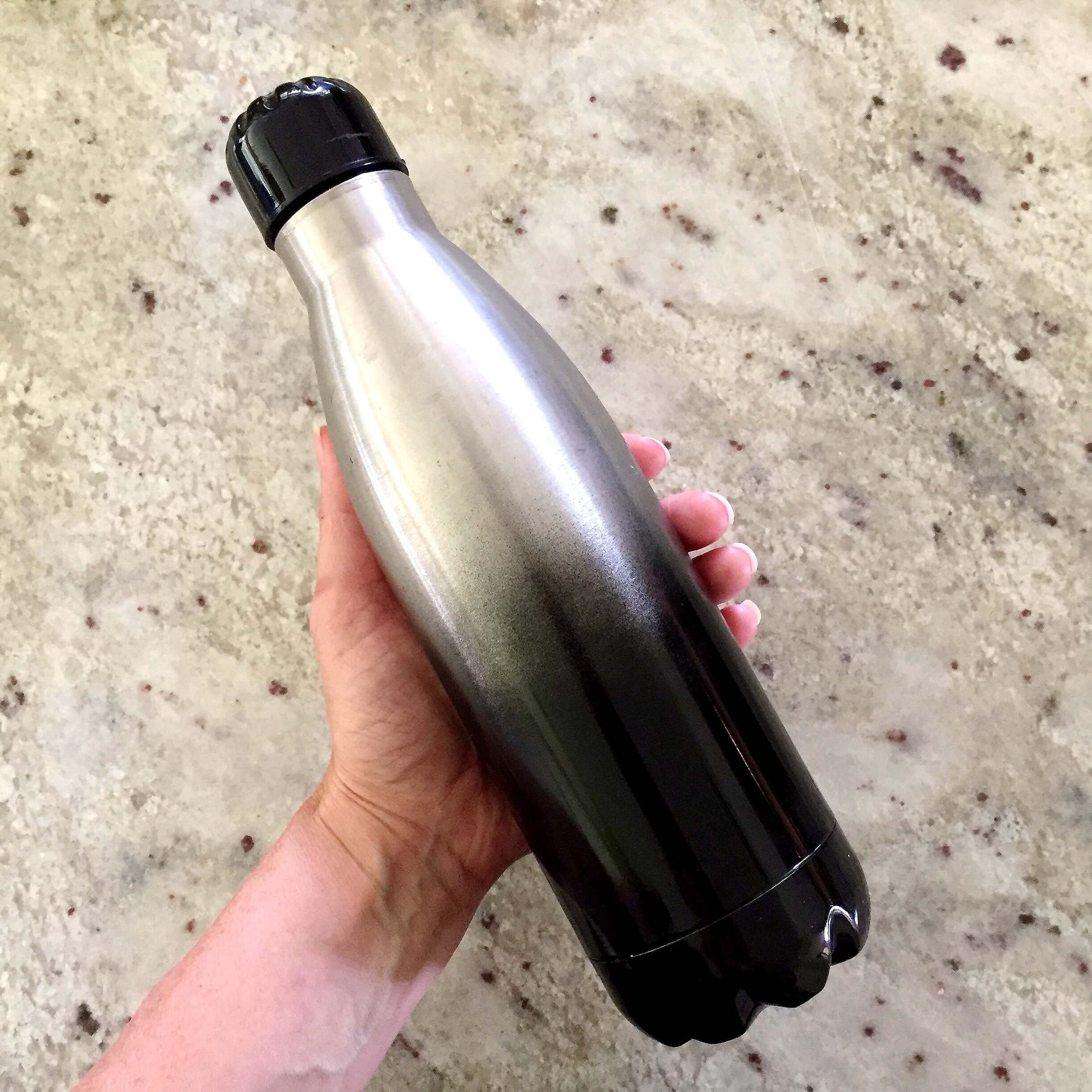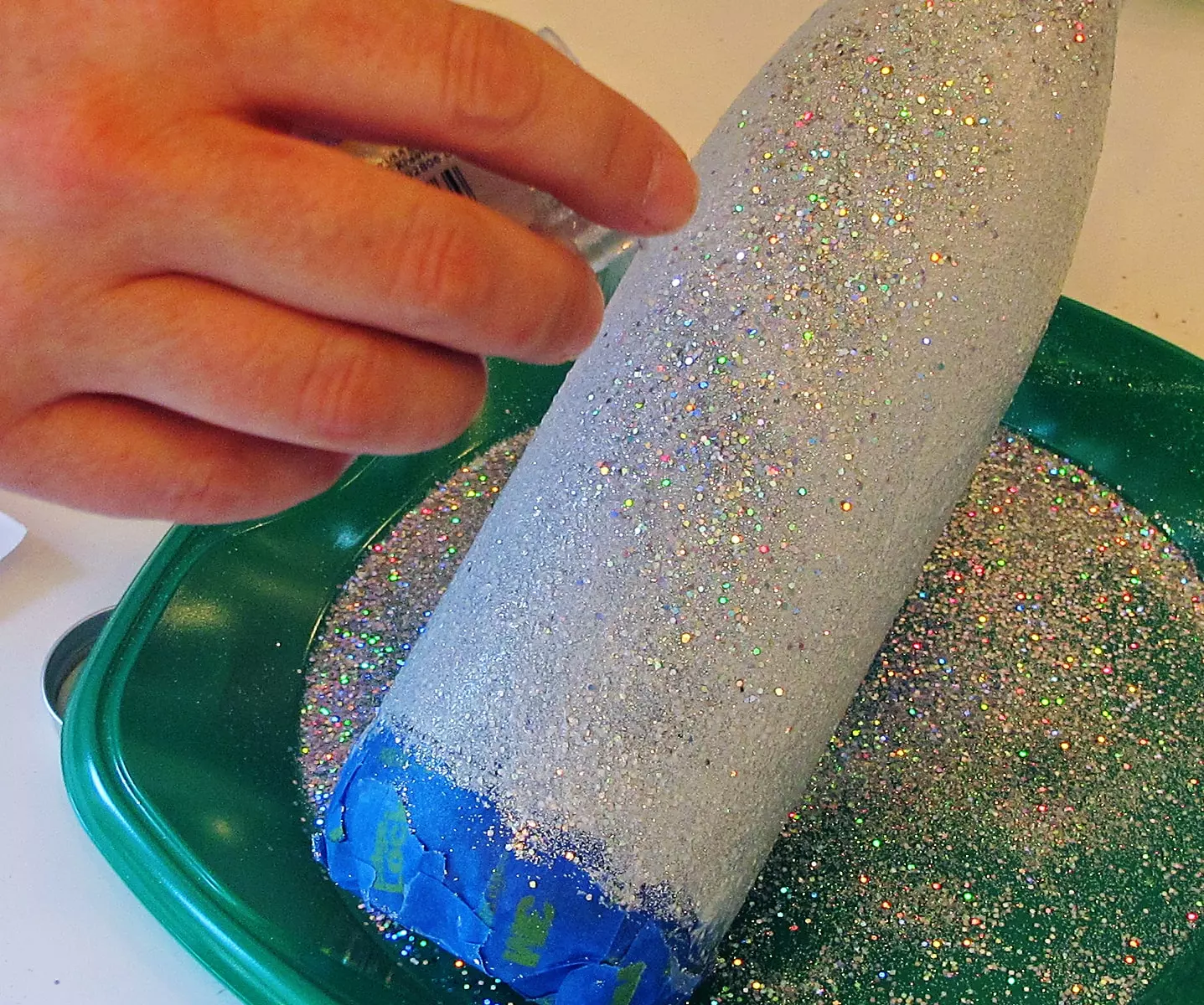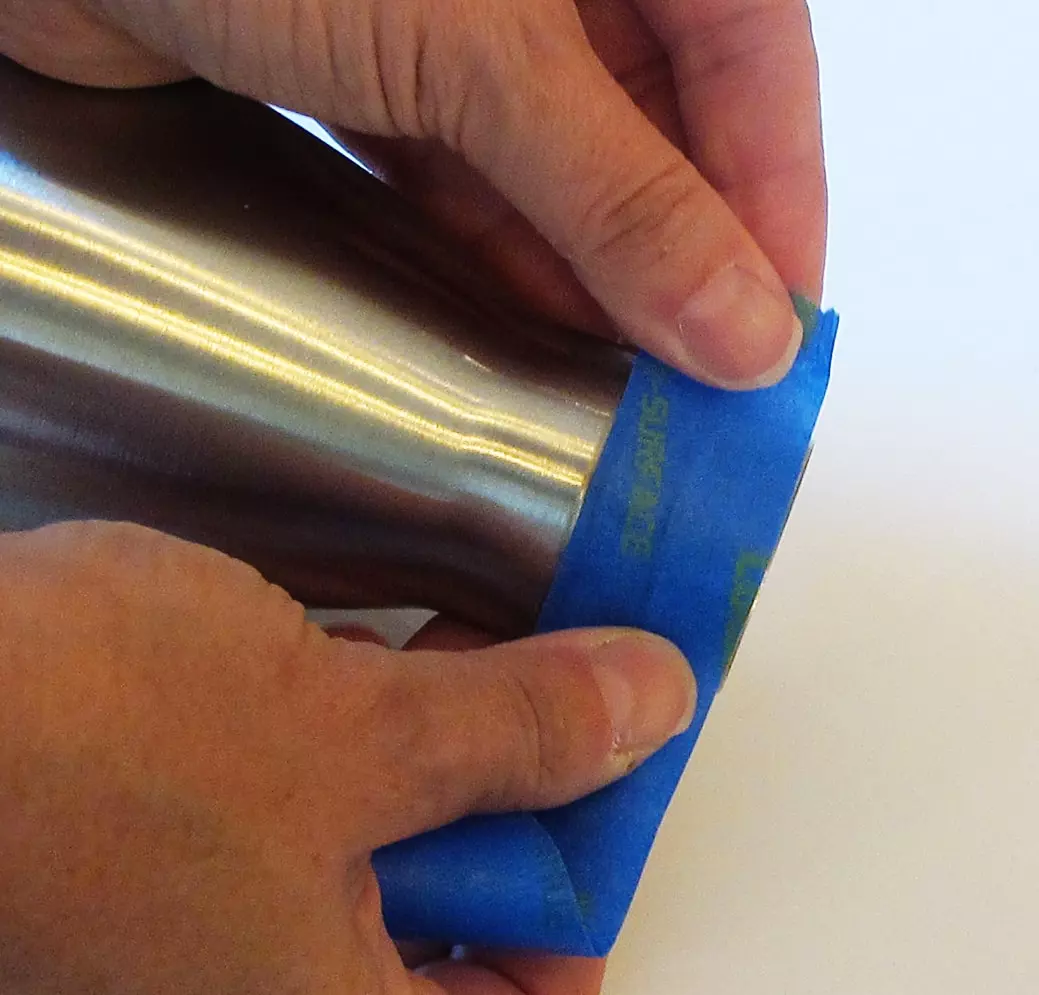
So how exactly do you make resin tumblers?
Step 1: Choose a tumbler
Stainless steel tumblers work best. Resin likes to stick to metal, so you don’t have to worry about your resin peeling off the surface.
This isn’t always the case when using plastic tumblers with resin. If you want to try, coat it with a plastic primer paint before applying resin.
Step 2: Clean your tumbler
For the resin to stick to your tumbler, it must be clean. Any dirt, grease, or oil will keep the resin from sticking. You can use isopropyl alcohol or dishwashing detergent.
Step 3: Decorate your tumbler
Gluing glitter to tumblers is an easy way to decorate them before adding clear epoxy. You can also add stickers or other art at this step. If you use paint, let it dry for 24 hours before adding epoxy.
💡 Pro tip: If you want to let the resin do the work, that’s cool. Skip this step and add glitter or colors to the resin and apply once your tumbler is turning.
Step 4: Set up your tumbler turner
Because mixed resin is fluid, you must keep your tumbler moving while the resin is wet. If you don’t, your resin will run off the side, pool in places, or coat unevenly.
The easiest way to keep your resin moving is to use a turner. This works like a rotisserie cooker to keep your cup moving. If your cup doesn’t move while the resin cures, it will pool on one side and hardly cover the other side. (Imagine pouring syrup over a stack of pancakes.)
💡 Pro tip: If you don’t want to invest in a turner, you can manually turn your tumblers several times while the resin cures. You’ll need to turn your tumblers 180 degrees every 2 to 3 minutes for the first 3 to 4 hours of the resin curing time.
Step 5: Protect areas on the tumblers where you don’t want resin
Because resin drips everywhere with this project, you need to tape off areas where you don’t want to get resin. Use painter’s tape to cover openings and places you don’t want the resin to cover.
Step 6: Prepare your work area
Because the resin will drip onto your work surface, be sure you protect your table. A garbage bag, plastic painter’s tarp, or a silicone mat are surfaces resin won’t stick to.
Step 7: Mix your resin
You want to use the Resin Obsession crystal doming resin for this project.
Why?
It cures beautifully clear and thick in only one coat. It also locks in epoxy colors if you want to use colored resin on your tumblers. And whether you leave it color or use it colored, it’s designed to finish without fisheyes and dimples.
An average-size tumbler takes 1/2 ounce of resin to cover it with a light coat. But you might want to mix more and have a couple of different projects ready to go just in case you have leftover resin. Here are a few of my favorite leftover resin projects.
By the way, if you’ve never mixed resin before, there are a few details you want to be sure to get right. Learn how to mix resin in five easy steps.
Step 8: Apply the resin
You may be wondering exactly how to make resin tumblers. Don’t be afraid. It’s actually pretty easy.
Use your stirring stick or a foam brush to apply the resin. You can also pour resin on your tumblers.
You can use your hands to apply the resin if you wear gloves. Smear it over the surface and blend colors.
Once the resin is partially cured (about 2 to 4 hours after mixing), you’ll want to remove the painter’s tape. The resin will be soft like gelatin, and any resin that ran onto the tape will peel away with it. If you want until the resin is completely cured, you’ll need to sand the resin to get this tape off.
If you’re using a turner, keep your tumbler turning until it is fully cured. This takes 24 hours.
Ta-da! You just learned how to make resin tumblers.
Want to see how to make resin tumblers?
Learn how in two minutes:
Are you frustrated with your resin results?
Want the easy way to resin success? Then get your copy of Resin Fundamentals. It contains the easy steps to creating beautiful resin crafts and jewelry. Even if you’re completely new to resin. Buy the PDF ebook now, and it’s yours to read to download in minutes.
Unpublished Blog Posts of Resin Obsession, LLC © 2023 Resin Obsession, LLC






I’ve seen where people spray paint the tumbler first, how long does that have to cure before I apply the resin?
I’m not sure, but if it were me, I would wait at least 24 hours.
I know this comment is a year old but I just wanted to leave a comment. If you read the can of spray paint it will tell you how long it takes for the spray paint to cure. I always wait 24 hours sometimes a little longer depending on how many I tumblers I am making at one time. I tend to spray paint all the tumblers I need at one time so that way that step is done and ready to go.
I made my first resin tumbler this past week. There is a small part at the top of the cup that’s plastic (where the inside part attaches to the outside, stainless part). I taped it off so the resin would have a nice, straight line around the top edge when it was done. The problem is that after I removed the tape, the resin is kind of sharp and might not be comfortable for putting your mouth on when you drink. All the videos I see put tape on, but no one mentions taking the tape off and if they have to do anything along that edge. I can sand it, but then it’ll need another clear coat to get rid of the scratches and I’ll have the same issue. I used stir sticks to put the resin on. Perhaps using a foam brush along the top would be better? Thanks for any suggestions.
Wait approximently 20-30 minutes after application and then remove your tape. The epoxy will gradually level and leave a nice clean edge where your tape was and you should not have to sand it. Good Luck.
What causes the frothiness around the edge of my molds?
Hi Sheryl, it sounds like your molds are hanging onto bubbles. This article will give you some ideas on some things to do differently: https://resinobsession.com/resin-frequently-asked-questions/resin-bubbles/
What is the best epoxy to use for tumbler cups and why do they lie where you at epoxy kind of leave a bald spot where there ain’t no epoxy
Hi Melissa, the best epoxy to use for tumbler cups is the Resin Obsession crystal doming resin. You can buy it in our store here: https://shop.resinobsession.com/collections/resin/resin-obsession-crystal-doming-resin. To make sure you don’t have any open spots, you want to use enough resin. The average tumbler takes 1/2 ounce, but larger tumblers will need more.
I want to apply a vinyl decal to a travel mug that has already been resined. Any hints?
Hi Dianna, make sure your resin surface is clean first.
After I paint my tumbler and clean it with dawn. I pour a light coat of coating and casting resin on the tumbler and smooth it all over the cup. Once it start drying I have more spots with out resin than with. What am I doing wrong?
Hi Dasha, you might not be using the right resin. A resin is either a coating resin or a casting resin, not both. I know there are lots of companies out there that tell you that you can use their products for both, but as you’re finding out, it doesn’t work well. This is the resin I use for tumblers: https://shop.resinobsession.com/collections/resin/products/resin-obsession-crystal-doming-epoxy-resin-jewelry-grade-16-oz-kit
Last week I applied Epoxy Resin to three cups that I airbrushed. This was my first attempt at applying epoxy resin on my cup turner. The finished result was a very lumpy inconsistent finish. I mixed the epoxy for more than five minutes and applied heat with a heat gun. My room temperature was also good. The epoxy went on smooth but as it dried it seemed to separate and almost collect in certain areas. I added more epoxy about 3 hours into the process to see if I could get it to level out. This didn’t help. So today I tried again on three more cups. Thinking my previous failure was from too much epoxy I kept my amount to a minimum. Again the epoxy went on smoothly and evenly but again within 45 minutes I could see the epoxy drying unevenly. I’m using Craft Resin brand epoxy which appears to be meant for tumblers. What am I doing wrong? The cups are still on the turner 3 hours into the pour. I briefly hit them with a heat gun to see if I could get the epoxy to flow out smoothly but that was unsuccessful.
Hi Terry, this sounds frustrating! This article will help: https://resinobsession.com/resin-frequently-asked-questions/why-does-my-epoxy-have-dimples/
Sounds like your epoxy is making fish eyes? Like certain spots are rejecting the epoxy if this is the issue it could most likely be just a bad batch of epoxy. (I have had this happen before) Could absolutely have nothing to do with anything that you are doing at all. Some times these things happen.
I know that epoxy can get rather expensive but I would try purchasing a different batch of epoxy make sure that the batch number on the box is different, and try again if you’re having the same problem I would say the epoxy and the paint you are using do not work well together.
This post is a game-changer! I love how you broke down the process step-by-step and shared those helpful tips. Can’t wait to try making my own resin tumblers without the stress. Thank you for the inspiration!